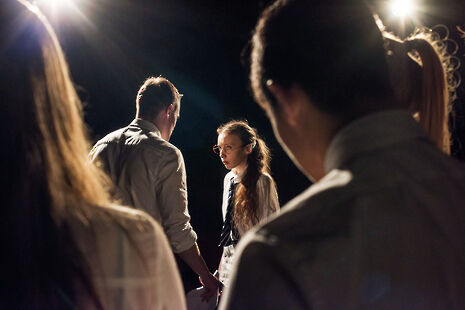The Evil
Sarah-Jane Tollan is hit by this visceral and energetic play

The sound of a whip cutting through the air, the pants and grunts of an abusive father, the curdling screams of a boy as boiling water is poured over him, four times. Rebecca Vaa’s one-act production of The Evil, originally a novel by Swedish author Jan Guillou, is laced with dizzying energy; characters are constantly on the move, whether with their fists or their feet, and yet it is in those few moments of complete stillness, with nothing other than the reverberation of a stamping foot dangerously close to a person’s head on the floor, that the energies of the play truly hit you.
Our narrator is Erik (Ed Limb), who switches between author and character and pulls us into his past; the systematic beatings from his father, the mother too afraid to act against it, the time when he became kingpin of his school playground until he was sent to boarding school, an escape into more violence, and more evil. He befriends Pierre, the token bespectacled bookworm, who encourages him to renounce his fists with Gandhi’s teachings of non-violent protest. His father, the words from his schoolmaster that he is evil, that he must be destroyed, never remain distant as Erik works his way through an environment in which the weak are systematically abused and the sadistic Student Council reigns.
The play hinges upon Limb, who gives a charismatic, swaggering performance of an adolescent who only knows of violence; his energy and pace never cease, despite the demands that the production place upon him, and he draws you in with his arresting, highly entertaining narration. Ellen McGrath plays the role of Erik’s peaceful, sane counterpoint well, although it is only in her Christ-like crucifixion to the buckets of boiling water that her performance asserts itself.
Yet the production falls short of really grappling with and submerging its audience into its thematic core: the nature of evil. The onslaught of violent scenes, the repetition of sadistic characters that seem indistinguishable and beyond belief, creates a world in which evil seems inevitable, and completely consuming. Perhaps this would have been balanced out if the relationship between Erik and Pierre, a friendship upon which the emotional potency and philosophical argument of the play are pinned, had not appeared so muted, or disconnected; the heart of the play is removed and lost as a result.
The Evil is, in spite of this, a production that grips your attention and refuses to let go, largely due to the charm and talent of the cast and the highly creative fight scenes that are quite dazzling to watch (with credit to Hao Feng for the inventive choreography). Whilst the one hour running time did not seem enough, crushing and limiting the themes, the play cemented itself in that hour as an animated, action-packed reflection on the struggle of goodness in a world of evil, whether intended or not.
 Features / Should I stay or should I go? Cambridge students and alumni reflect on how their memories stay with them15 December 2025
Features / Should I stay or should I go? Cambridge students and alumni reflect on how their memories stay with them15 December 2025 News / Cambridge study finds students learn better with notes than AI13 December 2025
News / Cambridge study finds students learn better with notes than AI13 December 2025 Comment / The magic of an eight-week term15 December 2025
Comment / The magic of an eight-week term15 December 2025 News / News In Brief: Michaelmas marriages, monogamous mammals, and messaging manipulation15 December 2025
News / News In Brief: Michaelmas marriages, monogamous mammals, and messaging manipulation15 December 2025 News / Uni Scout and Guide Club affirms trans inclusion 12 December 2025
News / Uni Scout and Guide Club affirms trans inclusion 12 December 2025









